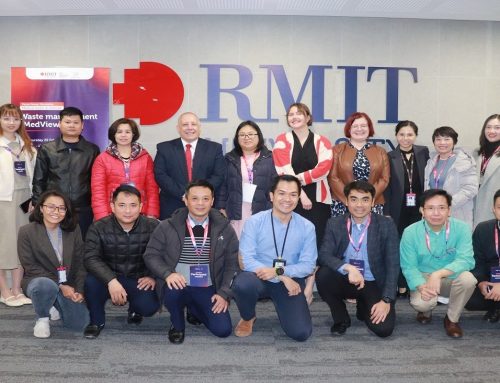This paper is based on a panel discussion at the 2015 conference of the European Operations Management Association (EurOMA). The panel brought together three academics and one practitioner to discuss how humanitarian logistics research can become more relevant for practice. Logistics is a central function in every humanitarian operation. It aims to deliver the supplies needed to support the victims of a disaster as fast as possible. This important activity is commonly referred to as humanitarian logistics.
Because of its importance and potential to create positive impact on humanitarian operations, the field of humanitarian logistics has become very popular in academic circles in recent years. A specialized journal has been launched, and multiple journals have published dedicated special issues on humanitarian logistics. As of November 2015, a total of 788 papers, conference proceedings, or book chapters have been written on this topic. However, despite the high volume of publications, humanitarian logistics research did not generate as much impact on practice as it could have. This lack of impact can be explained by the fact that humanitarian logistics research has not always been relevant for practice.
During the panel discussion, we identified a number of barriers that limit the relevance of humanitarian logistics research. We found that research problems were often defined based on the researchers’ interest rather than through a discussion with humanitarian organizations. Also, researchers have sometimes failed to take the specific context of humanitarian operations into account. Humanitarian logistics is very specific and differs from commercial logistics in several ways, such as the impossibility to predict future needs, or the scarcity of resources. Access to data is another challenge in humanitarian logistics research. Ready available data does not exist, and it is extremely difficult to collect it, due to safety concerns and the urgency under which most of the disaster response operations unfold. A lack of validation of results with practice is another barrier to relevant research in humanitarian logistics. It is not uncommon that researchers collect data in an organization, write a paper but then fail to discuss the results with the organization. This leads to studies that make wrong assumptions, or even find incorrect results.
Despite these barriers, relevant research in humanitarian logistics is being published. However, it is difficult for this research to make an impact on practice, for a number of reasons. Papers published in academic journals are not freely accessible, and humanitarian organizations cannot pay for subscriptions to all journals in which humanitarian logistics research is published. Humanitarian logistics research has also been impeded by a lack of trust between humanitarian organizations and researchers. Communication is another barrier, as researchers often use technical language and terminology, and fail to adapt their writing to a non-academic audience. Finally, competition between academic institutions has sometimes given an impression of duplication of efforts, which created confusion for humanitarian organizations.
Recognizing the barriers described above, we propose a possible charter of 10 rules describing how academics and humanitarian practitioners should work together in order to make research more relevant for practice.
1. Know the context: Learn about the humanitarian context before starting research in this field
2. Select problems that matter: Define a relevant problem with a humanitarian organization
3. Define performance metrics: Define how the success of the project will be measured
4. Open agendas: Communicate about mutual interest and objectives in the project
5. Long term partnerships: Seek a long term, mutually beneficial research partnership
6. Get involved in data collection: Collect data yourself, through interviews or surveys
7. Validate findings with the organization: Share and validate results with the organization
8. Translate: Write up the results in language that is accessible to practitioners
9. Disseminate results: Share results with practitioners through an open access repository
10. Coordinate research activities: Avoid duplication of research efforts
Based on these findings, we discuss a number of implications for academia and practice. First, academia should deepen its knowledge of the humanitarian context by talking to practitioners and reading practice oriented reports. Second, researchers should identify a humanitarian organization with which to conduct research, and define a project together, including metrics on how to measure success. Third, the researcher should discuss and validate the results of the project with the organization. Finally, the researcher should disseminate the results with the broader community, by translating the paper into accessible language and distributing it through an open access repository. Research institutions should reward researchers for these efforts.
Our findings also have a number of implications for practice. First, humanitarian organizations should take a more strategic approach towards research and coordinate all research collaborations the organization is involved in. Second, humanitarian organizations should recognize the need for researchers to publish their results in order to benefit the entire community. The appropriate level of confidentiality of data has obviously to be discussed and mutually agreed. Third, humanitarian organizations could work together to define a set of most pressing research issues and guide researchers in studying tem.
Despite these recommendations, a number of challenges remain. Coordination of research efforts is needed, but not easy to achieve between competing academic institutions. Universities could coordinate between each other and allocate research issues to researchers based on their skills and specialization. Such coordination could be enabled through a common platform listing research needs of practice and research capabilities of universities. A donor is needed to invest in such platform and attract interest from universities and humanitarian organizations.
Another challenge is the complexity of technical language used in existing research, which makes it hard for humanitarian practitioners to understand and apply research findings. We suggest a professional writer could be hired to prepare two pages managerial summaries of most relevant papers, and making them available on an open access repository. The cost of such initiative however cannot be covered by universities and humanitarian organizations, and requires external funding.
Finally, the limited accessibility of academic publications is another challenge. Because humanitarian organizations do not have the funding to pay for subscriptions to academic databases, they cannot access published papers. An open access repository of humanitarian logistics papers could be an option, but the right approach should be discussed with publishers. Researchers could eventually upload the final manuscripts of their papers into the repository, which would address the copyright issue. Such dedicated repository would allow humanitarian organizations to access existing research and have a one place access with all papers that relate to humanitarian operations research. Setting up such repository would require external funding that universities and humanitarian organizations cannot provide.
————————-
The full version of this article can be requested from nathan.kunz@unf.edu and can be cited as follows:
Kunz, N., Van Wassenhove, L.N., Besiou, M., Hambye, C. & Kovács, G. (2017). Relevance of Humanitarian Logistics Research: Best Practices and Way Forward. International Journal of Operations and Production Management. Vol. 37, No. 11, pp. 1585-1599.




